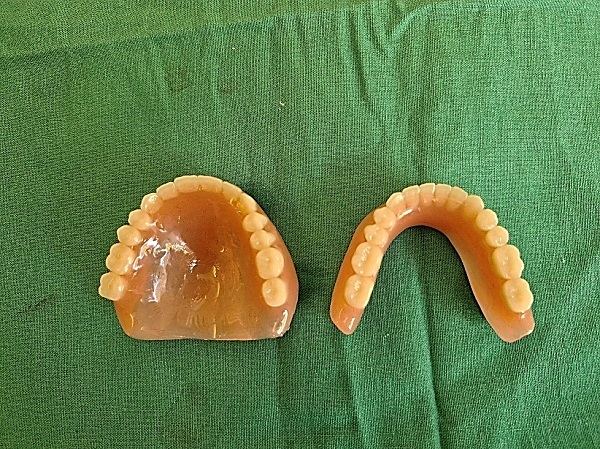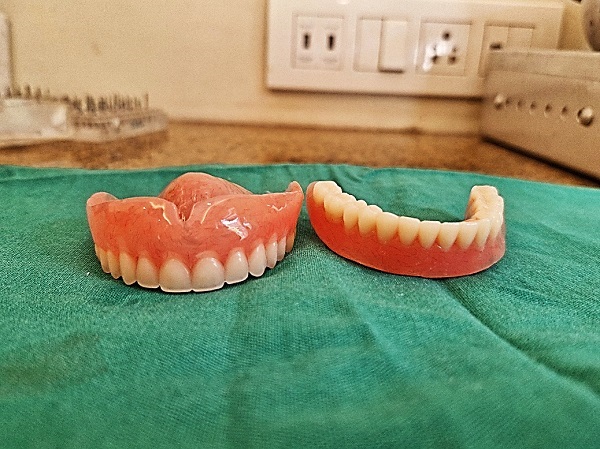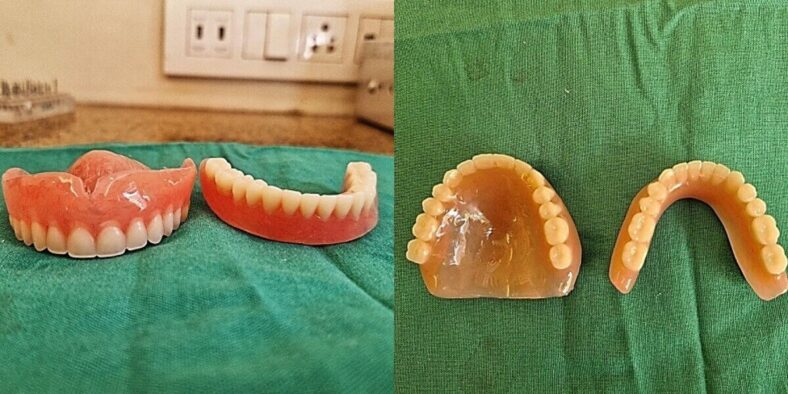For people who are losing teeth, choosing to replace their missing teeth is crucial. Before continuing, it’s important to comprehend your options, regardless of whether it’s because of aging, an injury, or an illness. Dentures and dental implants are the two options for the replacement.
Dental Implants: What Are They?
In order to replace lost teeth, dental implants are titanium posts that are surgically inserted into the mandible. In a process known as osseointegration, these implants gradually unite with the bone to form a strong base for prosthetic teeth. Dental implants, in contrast to typical dentures, provide a permanent and stable solution to tooth loss by closely resembling the appearance and functionality of natural teeth.
The most recent and long-lasting method of replacing lost teeth is with dental implants. Although implant forms might vary, they typically resemble screws.
Dental Implant—X-ray
Dental implants not only feel and look like natural teeth, but they also let you:
Make your smile better, Eat the foods you like; chew food again for easier digestion; talk more easily; restore your face structure; lead an active and enjoyable lifestyle; and live confidently.
How is an Implant Positioned?
The implantologist uses specially made instruments and a mild surgical technique to insert one or more implants into the jaw bone while administering a topical anesthesia. Gum tissue will either cover the implant or, in certain situations, it will be left uncovered and given two to three months to recuperate. Attaching the prosthetic components on top comes next. You can fill up the gap with a temporary bridge or denture during this healing phase. Thus, you always have teeth.
In some circumstances, we also provide immediate implants.
We provide Osstem implants, which are the best quality implants.
The patient returns to the dentist’s office to have the restorative process finished after two to three months or longer in some situations. The tissues have now recovered, the implant has stabilized inside the bone, and it is prepared to hold the prosthesis or tooth crown that will be fixed to it. A custom-made crown is placed on top of the implant to restore its function and appearance.
Dental implants are made to resemble the structure of your original teeth.
The Process of Dental Implants:
- Consultation and Planning for Treatment (CBCT will be advised).
- Placement of the Implant.
- Healing: It will take several months for the implant to integrate with the jawbone following placement. This procedure called osseointegration.
- Placement of the Crown: The restoration is completed by placing a custom-made crown on top of the implant after it has fused with the bone.
Do Dental Implants Make Sense for You?
Patients with one or more missing teeth who have enough bone density to stabilize the implant are the best candidates for dental implants. Dental implants might be the ideal option if you are missing teeth and want a long-lasting, natural-looking replacement.
Fort Dental Clinic will assess your specific needs during your appointment and develop a personalized custom-made dental implant.
Cost of Dental Implant:
The cost of dental implants will depend & vary case to case.
Dental Implant Advantages:
- Natural Feel and Appearance: Implants work just like natural teeth, giving you the confidence to eat, talk, and smile.
- Length and Durability: Dental implants are a more affordable option than standard dentures or bridges, which may eventually need to be replaced.
- Enhanced Dental Health: By promoting bone formation, dental implants aid in maintaining the integrity of the jawbone.
- Stability and Comfort: Dental implants offer a stable and pleasant fit because they are firmly fixed into the jaw, unlike removable dentures. You may talk and eat with ease because you won’t have to worry about your implants moving or slipping.
- No Effect on Neighboring Teeth: Dental implants don’t involve removing good teeth, in contrast to traditional bridges. Your natural tooth structure is preserved.
Cons:
- Surgical procedure.
- Healing period: The implant will merge with the jawbone over the course of several months following placement.
- Cost: Because dental implants need a bigger upfront commitment, they can be costly due to the cost of the materials and surgical procedure.
Suitable Candidates:
People with adequate jaw bone density, healthy gums, and no significant oral health problems are the ideal candidates for dental implants. In general, implant results are greater for nonsmokers or people who are dedicated to practicing good oral hygiene. It is an excellent choice for younger individuals. Additionally, it boosts confidence.
Dentures: What are they?
Both complete and partial dentures are types.
Removable prosthetics called dentures are used to replace lost teeth. Partial dentures are used when some natural teeth are still present, whereas full dentures replace an entire set of teeth. Custom-made to fit the wearer’s mouth, these devices are usually composed of acrylic or a combination of acrylic and metal.
Denture Images


Advantages:
- Affordability: For people looking to replace a tooth, dentures are frequently an affordable option.
- Fast to fit.
Cons:
- Not Fixed: Dentures are not fixed to the mouth permanently.
- Periodic adjustments: As the mouth, especially the gums and jawbone, changes, dentures must be adjusted.
- Potential for discomfort: In order to guarantee a pleasant fit, it is necessary to make changes on a frequent basis because poorly fitting dentures may result in sores, irritation, or discomfort.
Suitable Candidate:
For those who have several missing teeth, or would rather not have surgery, dentures are the best option. They are also ideal for people who smoke a lot, have poor dental hygiene, or are unable to have surgery for medical reasons.
Important Distinctions
- Appearance and functionality: Dental implants replicate the natural feel and appearance of natural teeth, providing a more natural appearance and function.
- Durability and lifespan: Implants have a reputation for being long-lasting, and with the right maintenance, they can last a lifetime.
- Cost comparison: Implants may appear pricey because of dental technology, but over time, their extended lifespan may make them more economical.
- Fixed vs. Removable: Dentures are prosthetic devices that can be removed, while implants are fixed and anchored to the bone.
Elements to Take into Account When Selecting
Your age, lifestyle, and financial situation are some of the most important considerations when deciding between dental implants and dentures. In the long run, dental implants might be a better choice if you have adequate bone density and good oral health. The optimal option for you will ultimately depend on your comfort preferences, long-term objectives, and dental health.
A dental specialist should be consulted while making the crucial decision of selecting the best tooth replacement solution. You may choose the ideal alternative for your needs by weighing the benefits and drawbacks of dental implants and dentures. This will guarantee that the solution suits your long-term oral health objectives, lifestyle, and financial constraints. Whichever solution you decide on, maintaining a healthy smile and getting the results you want depend on proper care and upkeep.

